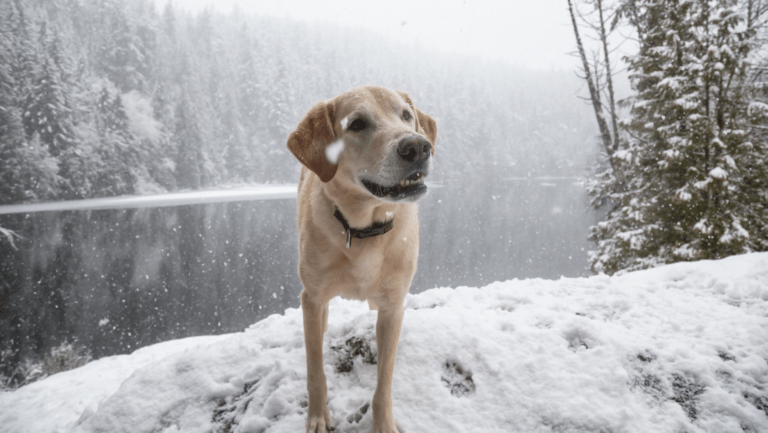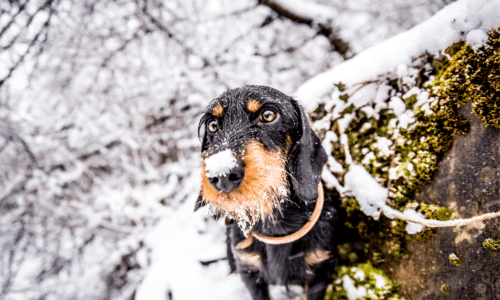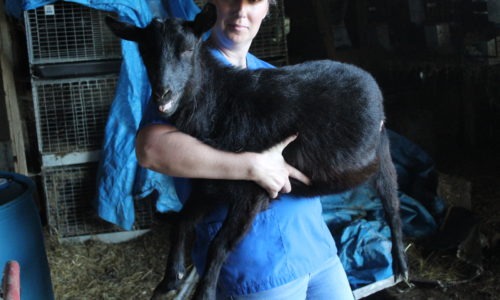As a major winter storm approaches, the Humane Society of Greater Dayton is urging pet owners to take extra precautions to keep their animals safe. Freezing temperatures, snow, and ice can pose severe risks to pets, but with proactive care, their safety and well-being can be ensured.
Top Winter Storm Tips for Pet Owners
Keep Pets Healthy and Indoors
- Stay Indoors: Whenever possible, bring pets indoors during the storm. Even animals with thick fur are vulnerable to frostbite and hypothermia during extreme cold.
- Schedule an Exam: Pets may face health challenges in cold weather. Schedule a preventive care exam with your vet to ensure your furry friend is ready and healthy for the chilly season. Arthritis and other conditions can worsen in the cold, so a wellness check is a pawsitively good idea! Don’t have a vet? Schedule an appointment with us at the Dayton Humane Veterinary Hospital by calling (937) 965-4399.
Outdoor Shelters for Companion Animals
Although keeping pets outdoors is not ideal, Ohio law permits animals to remain outside as long as they have adequate shelter and access to fresh food and water. For pets that must remain outdoors, proper shelter is essential:
- Bedding Materials: Never use blankets or hay as bedding. These materials absorb moisture, freeze, and can do more harm than good. Instead, use straw, which is naturally water-repellant and provides warmth, comfort, and insulation.
- Shelter Design: Ensure your pet’s shelter is sturdy, waterproof, and insulated. Position the entrance away from prevailing winds, and keep the shelter off the ground to prevent moisture buildup.
- Access to Food and Water: Ensure pets have fresh, unfrozen water and adequate food to maintain their energy levels. Heated water bowls can be helpful in sub-freezing conditions.
Protect Paws and Skin
- Paw Care: Wipe paws clean after walks to remove salt, ice, and chemical de-icers that can irritate or harm you pet’s feet.
- Booties or Balm: Use protective booties or paw balm for added protection from the elements.
- Check Regularly: Frequent paw checks are essential. Cracked or bleeding paw pads can result from cold-weather injuries. Clip hair between the toes to reduce ice accumulation during walks.
Avoid Toxic Hazards
There are many things used by humans this time of year that can be toxic to your pets. Antifreeze can smell sweet and appealing to your pets so if you spill any, clean it up quickly to keep your pets safe. De-icers can also be toxic if swallowed. Protect your pet by avoiding these hazards. If you pet does ingest these items, contact your veterinarian immediately.
Limit Outdoor Exposure
Pets have varying tolerances to cold based on factors like coat thickness and health. Adjust outdoor activities according to your pet’s tolerance. Remember, arthritic and elderly pets may need extra care, while long-haired breeds still need protection. Also be aware of signs of discomfort such as whining, shivering, or weakness in your pet. These could be signs of hypothermia.
Emergency Preparedness
As the storm approaches, have a disaster kit ready for your pets, including:
- Five days’ worth of food, water, and medications.
- Updated identification tags and microchip information.
- Blankets, toys, and other comfort items.
Increase Food Portions
Outdoor pets may need more calories to stay warm, so consult your vet about their nutritional needs. As it takes pets more energy to stay warm, you may need to feed them more in the colder months to help their bodies produce more energy.
Resources for Pet Owners
The Humane Society of Greater Dayton offers resources to help keep pets safe this winter, including microchipping services and disaster preparedness checklists. For more information, call us at (937) 268-7387.




